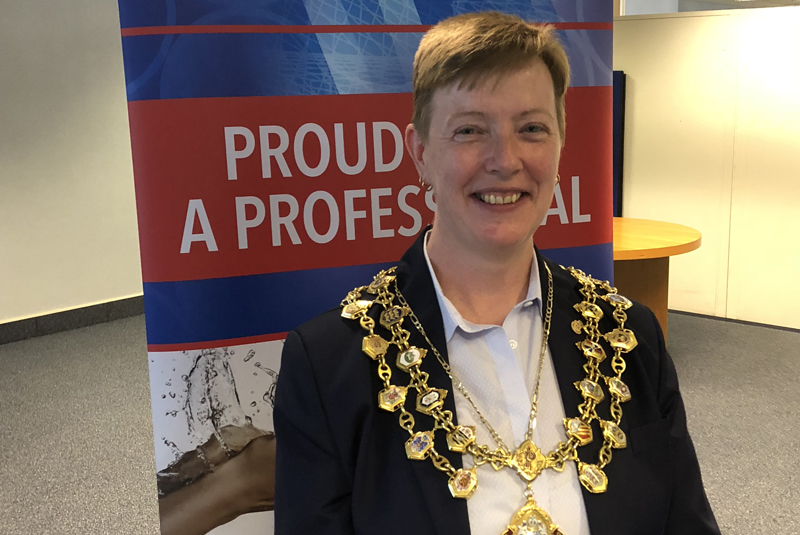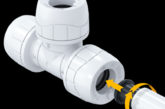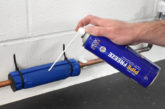
CIPHE President Tracey Richardson updates us on her first few months in the role.
Since becoming President of the CIPHE in June, I am now increasingly involved in the movement towards establishing a more regulated plumbing and heating industry in the UK.
One such area being explored at present is the Experienced Workers route. There is currently a route through for those undertaking level 2 plumbing and heating and a route for those seeking WaterSafe approval. However, the CIPHE believes those workers who have received good mentoring along their journey and can ably demonstrate their competence, should have their experience recognised in a formal manner too.
This is something I have noticed through personal contact with a number of Experienced Workers who are currently spending time working on building sites around the country. For example, these individuals have signed up for a level 2 qualification in order to continue working on live projects, despite having extensive knowledge and experience that far surpasses that required for just level 2.
The question of raising standards of delivery was high on the agenda when I attended the launch of a Plumbing Centre of Excellence at Havering College recently. Everyone involved there, from the Principal and Vice Principal to the wider staff, was keen to demonstrate a commitment to CPD by pledging to attend training and educational events on a regular basis in order to keep themselves as up to date as possible.
In addition to this, it was encouraging to learn that the college is considering other ways of enhancing courses so that they are delivered in a way that will keep learners actively engaged in line with their level of expertise.
Looking at social media channels such as Twitter, I can see there is much discussion around the subject of qualifications and their current worth. It seems fairly evident, judging by some of the comments I have read, that many would welcome a fresh approach to what is already available.
By comparison, many have also been critical of some of the current training standards that are applicable in this country, not to mention the opportunities these qualifications can lead to.
It would be wonderful if the industry and the CIPHE could wave a magic wand and ensure everyone attending accredited training courses are gainfully employed. However, for this to happen we would need to alter certain mindsets. For example, industry and employers need to have more confidence in the end product – this being the learner taking their first steps on the plumbing and heating ladder.
I am in a fortunate position that the training centre I work for only deals with Apprenticeships whereby the learners are fortunate enough to have already found employment. Having worked in an FE college in the past, as well as being involved with many other colleges around the country, I have first-hand experience of full-time learner groups that have some very ‘employable’ individuals.
That said, while some have realistic expectations, there will always be others that either have a very fanciful idea about the industry, attracted by the possible income that can be made (albeit with a lot of hard graft!) or simply because there wasn’t another job they were drawn to at the time.
These situations can happen, especially as tutors are under pressure from their management teams to meet certain targets by the end of the academic year. In fact, this was the main reason I left the college I once worked for. I didn’t want to compromise my own integrity by signing off learners who had clearly not made the grade or, in a couple of cases, hadn’t actually completed some sections of the qualification.
Learners themselves have a huge part to play in changing these types of situation. When they start a course, full of promise, many continue with this enthusiasm. However, those who have perhaps felt forced in the direction of a career in plumbing and heating can potentially be disruptive within student groups as a result.
In these instances, the work ethics of the minority who slip into nonchalant ways and become rather unreliable due to timekeeping issues etc. do little to encourage employers to take on future apprentices. Employers need apprentices that are willing to learn and can quickly understand the processes and requirements of the working day. The last thing any employer wants is to have to constantly and closely monitor an apprentice’s work for the entire duration of their training, which can take up to four years.
If the industry is minded to tackle important topics like this and others, such as enhanced teaching methods and the drive towards registration, then the best way to make improvements is surely by working together.
The message that it is better to have one voice as opposed to many is therefore a mantra I intend to repeat again and again without apology for the remainder of my CIPHE Presidency. So, if you have views on registration or any other plumbing and heating related matter, please get in touch via email: [email protected]













